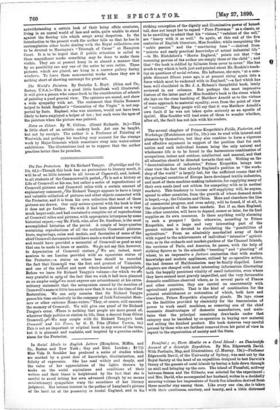The several chapters of Prince Kropotkin's Fields, Factories, and Workshops
(Hutchinson and Co., 12s.) can be read with interest and pleasure by themselves, but they also combine to form a vigorous and effective argument in support of the position that for each nation and each individual human being the only natural and wholesome life is to be found in the harmonious combination of occupations, indoor and outdoor, intellectual and manual, and that all education should be directed towards that end. Writing on the "decentralisation of industries," Prince Kropotkin brings into clear view the fact that already Ragland's position as "the work. shop of the world "is largely lost, for the sufficient reason that all the principal countries of Europe have developed textile industries, and most of them machine-making industries, for supplying many of their own needs (and not seldom for competing with us in neutral markets). This tendency to become self-supplying will, he argues, spread to other countries, from the growth of whose demand much is hoped,—e.g., the Colonies and China. Here and elsewhere the line of commercial progress, and even safety, will be found, if at all, in the development of the home markets. But if so, then England, like other countries, will have to depend, sooner or later, for its food supplies on its own resources. Is there anything really alarming in such a prospect ? Quite otherwise, according to Prince Kropotkin, and a large and very interesting part of the present volume is devoted to elucidating the "possibilities of agriculture." From an admirably marshalled array of facts with regard to the achievements of individual "intensive" agricul- ture, as in the orchards and market-gardens of the Channel Islands, the environs of Paris, and America, he passes, with the help of striking figures as to the scientific " breeding " and "planting" of wheat, to an impressive a fortiori contention that with modern knowledge and modern appliances, utilised by co-operative action, the bad dreams of Malthusianism may be finally dispelled. Later chapters are charged with most interesting information illustrating both the happily persistent vitality of small industries, even where they have seemed most gravely imperilled, and the very favourable domestic conditions observed where, as in several parts of France and other countries, they are carried on concurrently with agricultural pursuits. That is the kind of combination for the general establishment or restoration of which, both here and elsewhere, Prince Kropotkin eloquently pleads. He lays stress on the facilities provided by electricity for the transmission of power to work small machines, as removing one of the chief economic disadvantages of domestic manufacture, and main- tains that the principal remaining drawbacks under that category may be banished by co-operation in buying raw material and selling the finished product. His book deserves very careful perusal by those who are farthest removed from his point of view In regard to the organisation of society and the State.






































 Previous page
Previous page